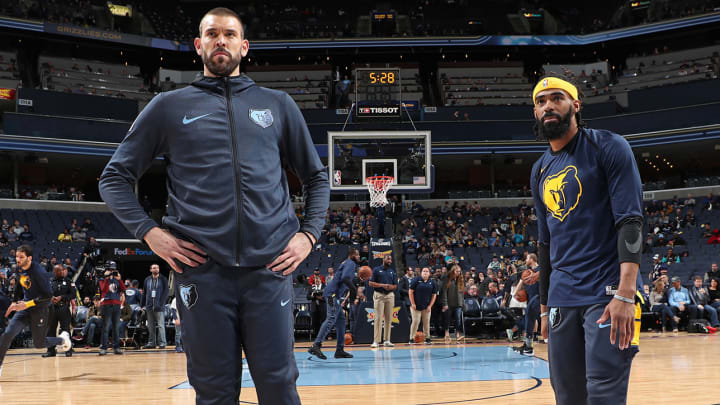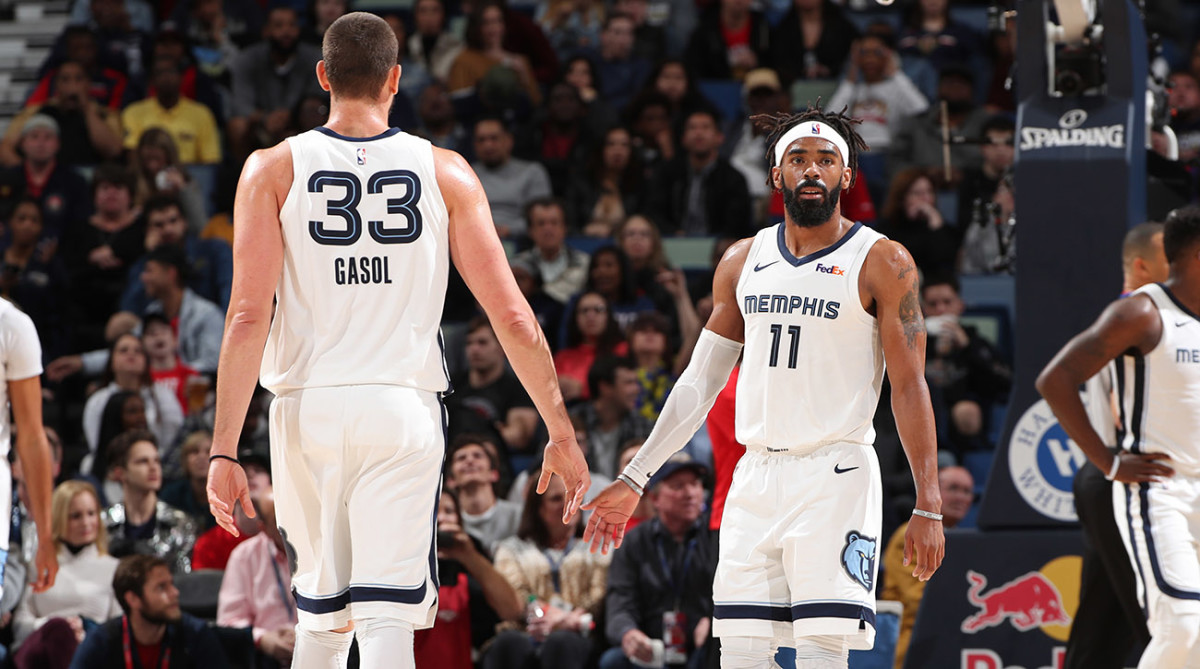Why Did the Grizzlies Wait so Long to Test Market on Conley-Gasol?

So the Memphis Grizzlies, fresh off a 20-point shellacking at the hands of the Anthony Davis-less Pelicans, will begin listening to trade offers for Marc Gasol and Mike Conley, ESPN reports.
Anything to take the stench off a sixth straight defeat, I guess.
There’s nothing shocking about Memphis deciding to shop its 30-something stars. The Grizzlies stink (again), a product of poor drafting, cap throttling free agent signings and age and injury deteriorating the Grizz’s top two players. They have lost 17 out of 20 headed into Wednesday’s matchup with Charlotte. They have won once in 2019. The offense is god-awful and Memphis’s bizarre decision to send Chandler Parsons home to collect his $24 million salary this season means it won’t get any better. Memphis is just six games back in the loss column for the final playoff spot but a Beale St. without booze is more likely than a Grizz run to the postseason.
Testing the market for Gasol and Conley is the right decision.
It just should have happened sooner.

This isn’t Monday morning quarterbacking here. I’ve been on the trade Gasol train for over a year, since Memphis sided with Gasol in the Gasol/David Fizdale dispute, canning the coach 19 games into the ’17-18 season. Gasol was still a good player, but it was clear that the Grizzlies—first round fodder the previous two seasons—were trending downward, which should have sent the front office into asset-maximizing mode.
It didn’t, and here we are.
A brief survey of rival team executives suggests the trade market for Gasol and Conley may not be robust. “Marc, defensively, is pretty limited,” an Eastern Conference personnel scout told The Crossover. “Physically, he can’t stay in front of a lot of switches.” Added a Western Conference executive, “They could get something for Conley. He’s healthy, and there are a lot of teams desperate for a point guard. They play it right, he could get them a lottery pick.”
Here’s the question Grizz fans have to wake up this week asking: Should all this have happened sooner? It didn’t take an oracle to figure out the team was on the decline. Years of whiffing on first round draft picks (Wade Baldwin, Jordan Adams) has weakened Memphis’s supporting cast, forcing the Grizzlies to overspend on the likes of Parsons and Kyle Anderson.
It’s not like Memphis didn’t get calls about Gasol and Conley, who missed most of last season with a heel injury. Grizz brass just chose not to listen.
And why is that? Gasol is an icon in Memphis. His connection to the city pre-dates his wearing a Grizzlies uniform, when he was a pudgy teenager crashing with his brother, Pau. Conley, too, has blossomed from risky draft pick (fourth overall, in 2007) to “overpaid” starter (remember the outrage at the five-year, $45 million deal Memphis handed Conley in 2010?) to a leader on the Grizz beloved Grit ‘n Grind teams.
There is an emotional investment in the two stars, but team executives are paid to look past emotional investments. For too long there has been this narrative that it’s sacrilegious to consider trading Gasol and Conley, and the Grizzlies clinging to the limited success the two franchise stalwarts offer has cost them. In sports, it’s better to be proactive than reactive when it comes to rebuilding, and Memphis right now is in full reactive mode.
Which brings us to another question Grizzlies faithful should be asking: If the time has come for a full-scale rebuild, is this the front office that should be overseeing it? Chris Wallace has been the GM since 2007. His power has been usurped—for several years after Robert Pera bought the Grizzlies, CEO Jason Levien was running the show—and reinstated (Wallace is more involved now, though Director Joe Abadi has final say) over the years, but he has been the one constant. And while Wallace should be credited for piecing together the Gasol/Conley/Zach Randolph Grizzlies, Memphis’s failure to retool on the fly falls on his lap, too.
MANNIX: Courting Kawhi: Can the Raptors Sell Their Star on Toronto?
If Wallace is the guy, great, invest in him, invest in a deeper scouting staff—the Grizz did hit on Jaren Jackson Jr., Memphis’s top pick last June, who appears poised to slide into Gasol’s center spot down the road—and go from there. But if he’s not, the real rebuild is in the Grizzlies front office. There is a common thread among successful small market teams: Basketball talent at the leadership level. Oklahoma City and Utah are prime examples. San Antonio’s success speaks for itself.
Market size isn’t an excuse for mediocrity. Lousy drafting is.
Pera has a dismal track record of NBA ownership. He went from uninvolved in basketball operations to overinvolved in the post-Levien world to in recent years resuming his position as an absentee landlord. He bought the team at the peak of its ascent and did little to ensure that it stayed there. He parachuted into Memphis to meet with Gasol and Conley last week and presumably signed off on the Grizz’s decision to shop the two stars.
This is a major moment for Pera, for Memphis, for the future of the franchise. The Grizzlies owe Boston a first round pick from the mind numbingly bad Jeff Green deal in 2014—it will convey this year if it’s outside the top-eight, next year if it’s outside the top six and in 2021 is unprotected—which hangs over the franchise’s rebuilding plans like an anvil. What Memphis gets for Gasol and Conley will shape its ability to build a winner after them. They need draft picks to rebuild around Jackson and a front office smart enough to hit on them.
The Grit ‘n Grind Grizzlies have been over for years now. Memphis, finally, is accepting it.
